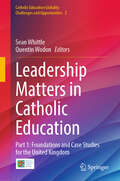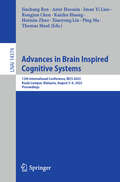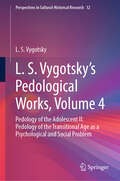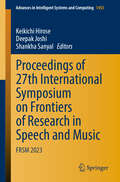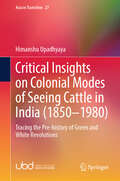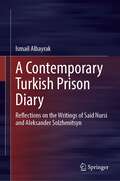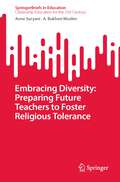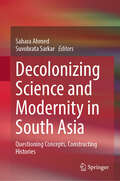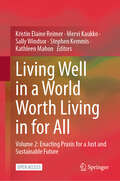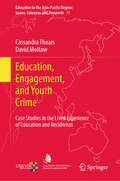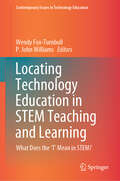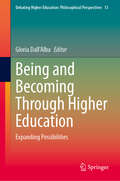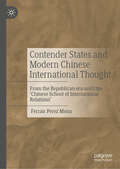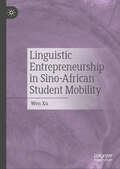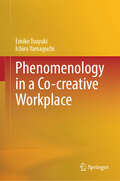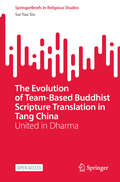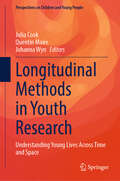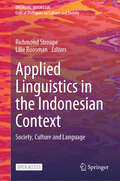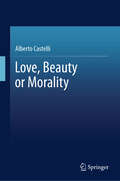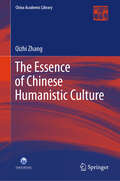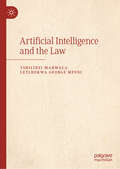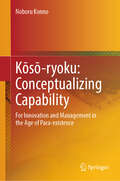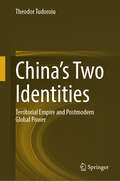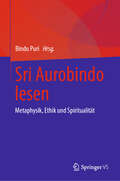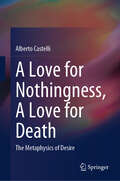- Table View
- List View
Leadership Matters in Catholic Education: Part 1: Foundations and Case Studies for the United Kingdom (Catholic Education Globally: Challenges and Opportunities #2)
by Quentin Wodon Sean WhittleThis edited collection is the first part of a two-volume set., which focuses on leadership in Catholic education settings in the United Kingdom. It includes an overview of the importance of different types of leadership, including ‘servant-leadership’, in understanding and framing Catholic school practice, a critical survey of why leadership matters to ensuring the success of Catholic education, and a discussion of what counts as the defining characteristics of leadership in Catholic education and how this relates to the aims or philosophy of Catholic education. The chapters in this book draw from the insights and experiences of serving Catholic school leaders as well as from academics and researchers in Catholic education studies. The final two chapters provide a comparative analysis for the United Kingdom in a global perspective using data from the Organisation for Economic Co-operation and Development (OECD) . Together, the chapters argue that there is an urgent need to find, nurture, and sustain outstanding leaders for Catholic schools and colleges.
Advances in Brain Inspired Cognitive Systems: 13th International Conference, BICS 2023, Kuala Lumpur, Malaysia, August 5–6, 2023, Proceedings (Lecture Notes in Computer Science #14374)
by Amir Hussain Huimin Zhao Jinchang Ren Kaizhu Huang Rongjun Chen Iman Yi Liao Xiaoyong Liu Ping Ma Thomas MaulThis book constitutes the refereed proceedings of the International Conference on Brain Inspired Cognitive Systems, BICS 2023, held in Kuala Lumpur, Malaysia, in August 2023. The 36 full papers included in this book were reviewed and selected from 58 submissions and are organized in thematic sections as follows: Bio-inspired systems and Neural Computation; Image Recognition, Detection and Classification; Vision and Object Tracking; Data Analysis and Machine Learning and Applications.
L. S. Vygotsky's Pedological Works, Volume 4: Pedology of the Adolescent II: Pedology of the Transitional Age as a Psychological and Social Problem (Perspectives in Cultural-Historical Research #12)
by L. S. VygotskyThis book contains a new translation of the second half of the Pedology of the Adolescent by the renowned Soviet thinker, educator and teacher L.S. Vygotsky. It was a correspondence course written by Vygotsky for teachers across the Soviet Union, and it constitutes the longest work published in his lifetime. Four chapters have never been translated before and appear here for the very first time. With this volume, Vygotsky concludes the sustained argument he commenced in Vol. 3 Pedology of the Adolescent I: Pedology in the Transitional Age, establishing the borders of pedology, the nature of the transition between childhood and adulthood, and the concrete nature of the distinction between the lower psychological functions we largely have in common with animals and those that are specific to fully social humans. In this volume Vygotsky "puts flesh on the skeleton" of his working hypothesis concerning the interests and the development of concepts in the psychology of the adolescent. He then frames concepts as a special case of developing higher psychological functions, and demonstrates the roots of that development in the social environment. Many of the problems Vygotsky broaches in these new chapters--the choice of a profession, the initiation of the adolescent into working life--are still of immediate, not to say urgent, relevance today. The volume concludes with a remarkable vision of a society "where production is organized for the producers" that still seems far ahead of its time and still ahead of our own.
Proceedings of 27th International Symposium on Frontiers of Research in Speech and Music: FRSM 2023 (Advances in Intelligent Systems and Computing #1455)
by Keikichi Hirose Shankha Sanyal Deepak JoshiThis book features original papers from 27th International Symposium on Frontiers of Research in Speech and Music (FRSM 2023), jointly organized by Sardar Vallabhbhai National Institute of Technology, Surat, India, and Sir C.V. Raman Centre for Physics and Music, Jadavpur University, Kolkata, India, during 4–5 August 2023. The book is organized into four main sections, considering both technological advancement and interdisciplinary nature of speech, music, language and their applications. The first section includes chapters related to computational, modelling and cognitive aspects of the speech signal. The second part contains chapters covering the foundations of both vocal and instrumental music processing with the signal, computational and cognitive aspects. The third section relates to the variety of research being done in the peripheral areas of languages and linguistics with special focus on regional languages of India. A lot of research is being performed within the speech and music information retrieval domain which is potentially interesting for most users of computers and the Internet. Therefore, the fourth and final section is dedicated to the chapters related to multidisciplinary applications of speech and music signal processing.
Critical Insights on Colonial Modes of Seeing Cattle in India: Tracing the Pre-history of Green and White Revolutions (Asia in Transition #27)
by Himanshu UpadhyayaThis book traces the contours of the symbiotic relationship between crop cultivation and cattle rearing in India by reading against the grain of several official accounts from the late colonial period to the 1980s. It also skillfully unpacks the multiple cultural expressions that revolve around cattle in India and the wider subcontinent to show how this domestic animal has greatly impacted political discourses in South Asia from colonial times, into the postcolonial period. The author begins by demonstrating the dependence between the nomadic cattle breeder and the settled cultivator, at the nexus of land-livestock-agriculture, as indicated in the writings of Sir Albert Howard, who espoused some of the most sophisticated ideas on integration, holism, and mixed farming in an era when agricultural research was marked by increasing specialisation and compartmentalisation. The book springboards with the views of colonial experts who worked at imperial science institutions but passionately voiced dissenting opinions due to their emotional investment in the lives of Indian peasants, of whom Howard was a leading light. The book presents Howard and his contemporaries’ writings to then engage contemporary debates surrounding organic agriculture and climate change, tracing the path out of the treadmill of industrial agriculture and factory farming. In doing so, the book shows how, historically, animal rearing has been critically linked to livelihood strategies in the Indian subcontinent. At once a dispassionate reflection on the role played by cattle and water buffaloes in not just supporting farm operations in the agro-pastoral landscape, but also in contributing to millions of livelihoods in sustainable ways while fulfilling the animal protein in the Indian diet, the book presents contemporary lessons on development perspectives relating to sustainable and holistic agriculture. A rich and sweeping treatment of this aspect of environmental history in India that tackles the transformations prompted by the arrival of veterinary medicine, veterinary education and notions of scientific livestock management, the book is a rare read for historians, environmentalists, agriculturalists, development practitioners, and animal studies scholars with a particular interest in South Asia.
A Contemporary Turkish Prison Diary: Reflections on the Writings of Said Nursi and Aleksander Solzhenitsyn
by Ismail AlbayrakThis book explores the religious experiences of two notable figures who endured severe trials under authoritarian regimes: Bediuzzaman Said Nursi (1877–1960) within the Islamic tradition, and Aleksander Solzhenitsyn (1918–2008) within the Russian Orthodox Christian tradition. Against the tumultuous backdrop of the twentieth century’s spiritual, social, political, and intellectual upheavals, both Nursi and Solzhenitsyn grappled with immense hardships because of their beliefs. Despite immense tribulations, both individuals demonstrated unwavering faith and resilience in the face of adversity, continuing their scholarly and literary activities. The current study centers on the dichotomy of spiritual confinement and expansiveness, illustrating how people can experience spiritual distress even without physical restraints. It explores the historical and conceptual aspects of imprisonment within Christian and Muslim perspectives, explores the reasons for Nursi and Solzhenitsyn's incarceration, examines their coping mechanisms in the face of hardship, and underscores the role of faith and spirituality. The author integrates personal experiences, particularly his own incarceration during the aftermath of the 2016 Turkish staged coup attempt, within the context of the narratives of Nursi and Solzhenitsyn. The book addresses court proceedings, release, departure from Turkey, and resettlement in Australia. Throughout, the author draws parallels between their own observations and those of Nursi and Solzhenitsyn, contributing to the broader discourse on individual spirituality and collective consciousness. The book offers insights into spiritual resilience in the face of adversity, utilizing the lives of these figures to illuminate shared human experiences. A unique collation of personal narration and scholarly reflection, it is relevant to academics and students in history, political science, sociology, Islamic and Middle Eastern studies, and to social scientists researchingthe phenomenon of exile and prison in different countries across the world. It also speaks to the work of activists and policymakers in human rights.
Embracing Diversity: Preparing Future Teachers to Foster Religious Tolerance (SpringerBriefs in Education)
by Anne Suryani A. Bukhori MuslimThis book presents a detailed discussion of Indonesian future teachers’ experience of religious diversity, tolerance and intolerance, their level of intellectual humility, and intentions to foster religious tolerance. Drawing from large-scale mixed methods research conducted in Indonesian universities involving over one thousand three hundred future teachers from diverse religious backgrounds, this book demonstrates that religion and religious beliefs can, and do, shape the way future teachers view their teaching practices and pedagogies. The book sheds light into the under-researched yet prominent issue of integrating tolerance into teacher education preparation. It is set in the largest Muslim-majority country in the world which, in recent years, has seen a gradual degradation of secularity while religion becomes more dominant across all levels and sectors of society. This novel and timely book is of interest to researchers, scholars, and students in religious studies, education, social sciences, and Asian studies, as well as anyone interested in the interplay between religion and education in the 21st century.
Decolonizing Science and Modernity in South Asia: Questioning Concepts, Constructing Histories
by Suvobrata Sarkar Sahara AhmedThis book offers a unique perspective on the colonial roots of modern science, technology, and medicine (STM) in South Asia. The book questions the deconstruction of imperial visions and definitions of science and modernity in South Asia. It presents an in-depth analysis of the contested relationship between science, modernity, and colonialism. It explores how new research can contribute to the diversification of perspectives in the history and sociology of modern South Asian studies. The chapters in the book delve into various aspects of STM in South Asia. It covers diverse topics, including the social, cultural, and pedagogic context of early modern Bengal, the popularization of science in colonial Punjab, the Hindi science periodical Vigyan, and the emergence of the Indian science community. The book also examines the intersection of indigenous medical practices, ayurveda, Unani, and medical revivalism and highlights peripheral creativity in science. The contributors engage with the existing historiography to raise new questions concerning the global circulations of scientific knowledge from the perspective of South Asia and the regional appropriation of the same. It connects the history of science and modernity with South Asia's socio-economic and cultural background. It offers valuable insights into the decolonization of STM. It greatly interests scholars and students of modern South Asian history, sociology, social anthropology, and Science, Technology and Society Studies (STS).
Living Well in a World Worth Living in for All: Volume 2: Enacting Praxis for a Just and Sustainable Future
by Stephen Kemmis Kathleen Mahon Mervi Kaukko Kristin Elaine Reimer Sally WindsorThis open access book is the second of a two-volume series that explores how people are living well and creating a “World Worth Living in for All”. It engages in deep listening of voices from across the world and considers the role of education in creating a more just and sustainable world for the future. The book asks what can be learnt to create change in policy and practice in order to enact praxis. It showcases chapters from international authors who discuss current or new projects to address the overarching questions explored in the book. It also provides an overview of perspectives that connect both volumes and the individual projects presented together through the lens of practice architectures.
Education, Engagement, and Youth Crime: Case Studies in the Lived Experience of Education and Recidivism (Education in the Asia-Pacific Region: Issues, Concerns and Prospects #71)
by Cassandra Thoars David MoltowThis book presents insights into how affective educational experiences may be associated with youth criminal behaviour and the pathway to recidivism. It explores the perspectives and lived school experiences of five young adult male prison inmates, including while they were incarcerated as youths. Through these case studies, the book explores the relationship between affective engagement in education and recidivism.This book shows that participants were affectively disengaged from education prior to their initial incarceration in a youth detention facility, and that their disaffection before, during, and after youth incarceration both generated and impacted on their cognitive and behavioural disengagement from education. Moreover, a range of additional factors not directly causally related to their schooling were shown to have had a significant effect on their engagement in education. The book considers a number of key findings. First, the foundational role that a sense of belonging plays in how young people experience education and its relation to crime. Second, the importance of individualized transition plans for youth at risk, and youth offenders before, during, and after incarceration. Third, the extent to which successful transition from youth offending and recidivism hinges on interagency collaboration. This book will be beneficial to teacher educators, education researchers, criminologists and sociologists.
Locating Technology Education in STEM Teaching and Learning: What Does the ‘T’ Mean in STEM? (Contemporary Issues in Technology Education)
by P. John Williams Wendy Fox-TurnbullThis book offers clarity and consistency of thinking in relation to Technology Education when situated within a STEM approach to teaching. It examines the range of Innovations and Issues which are being considered by schools as they implement STEM, with particular focus on the place of Technology, or the ‘T’ in STEM. The book is divided into three sections: Philosophy, Implementation and Issues and Innovations, with each containing five to seven chapters. The first section lays the foundations for the remainder of the book: it focuses the readers on the technology aspect of STEM education and situates it to align with the international understanding of technology education. The second section provides insights into how STEM is best implemented to give technology due consideration across a range of disciplines with technology education, including engineering, food technology, and textile technology. This section also provides suggestions for the successful implementation of the STEM approach, and offers further insight through a range of case studies. The third section outlines and discusses a range of issues that pose a threat to the position and understanding of technology within the STEM teaching and learning approach. This section also examines how technology and STEM are situated within, are supported or are threatened by, other current innovations and approaches to teaching an integrated curriculum, such as the Maker Space Movement and Play-based Learning.
Being and Becoming Through Higher Education: Expanding Possibilities (Debating Higher Education: Philosophical Perspectives #13)
by Gloria Dall’AlbaThis book focuses on the importance of an ontological dimension for today’s higher education, with critical attention to implications for the student experience, engagement, satisfaction, wellbeing, employability, (dis)embodiment and activism in which students take a stand on their own being and becoming. In accessible language, key philosophical ideas are explored for their relevance to contemporary higher education, integrating philosophical with pedagogical perspectives. Although much of the material has been published previously, there is value in bringing it together into a single volume in exploring an ontological dimension of higher education as it is embodied. In doing so, the book demonstrates benefits to pedagogy through sustained attention to philosophy and theory, and vice versa, thereby contributing to recent heightened interest in the philosophy and theory of higher education. This book is intended to prompt re-imagining the ways in which higher education is conceived and conducted. An argument is put forward for greater emphasis on expanding possibilities for knowing, acting and being, toward fuller lives of interdependence with others and things in an interconnected world. Through highlighting an ontological dimension in this manner, a hope-filled future emerges for higher education.
Contender States and Modern Chinese International Thought: From the Republican era until the ‘Chinese School of International Relations’
by Ferran Perez MenaThis book contends that the development of modern Chinese international thought has been profoundly shaped by the distinctive nature of the Chinese state as a contender state and its global positioning since 1912. The argument posited demonstrates that, notwithstanding the varied perspectives on the 'international' held by Chinese intellectuals throughout the 20th century, there exist commonalities across the periods analyzed in this book. In essence, the book emphasizes that the shared elements influencing the production of modern Chinese international thought do not derive from a unified cultural Chinese identity but rather stem from China's evolving geopolitical position in the modern world.
Linguistic Entrepreneurship in Sino-African Student Mobility
by Wen XuThis book explores African international students’ lived experience within Chinese higher education, including their language ideologies, investment in Chinese language learning and the (re)shaping of identities and aspirations. Whilst high English proficiency has been sought by globally mobile students to play the ‘class game’ and gain entrée to the circle of elites, considerably less attention has been paid to how shifting global structures and China’s semi-peripheral position shape its language learners’ investment and identity construction. Drawing upon a series of interviews, the book deciphers African students’ logics of linguistic exchanges within the geopolitical and geo-economic context of China-African relations. The students invested heavily into Chinese language learning and use, while displaying perfectionism, linguistic entrepreneurship and linguistic insecurity. As the value of their Chinese linguistic capital increases, they reassessed their sense of themselves and produced different social identities, which includes the idea of ‘the world is my oyster’, contributing to Africa’s sustainable development and the disposition to ‘tell China’s story well’. This work transgresses monolingual dominance (i.e. English) in the existing body of international student mobility and second language acquisition (SLA) research, as great importance is assigned to Chinese as linguistic capital in South-South student migration. The book is of interest to researchers in international higher education, international student mobilities, sociolinguistics, applied linguistics, languages education, and Chinese language teaching and learning.
Phenomenology in a Co-creative Workplace
by Ichiro Yamaguchi Emiko TsuyukiThis book introduces phenomenology to reveal how the atmosphere and relationships in the workplace are generated and how this affects creativity. In their daily work, people sometimes feel that "today's meeting was more exciting than expected" or that "everyone's motivation is down”. This unspoken workplace atmosphere has a significant impact on their work. But has enough thought been given to how this workplace atmosphere is created? Phenomenology reveals the basic structure of human relationships in the workplace. Are there any general rules that govern human interaction and the nature of relationships in that workplace? If these unspoken rules can be made explicit – clearly felt and spoken — people can work together to bring about a creative workplace in which individuals can maximize their abilities. The main point of the book is that human relationships are based on a two-layered structure: "emotional communication", which is rooted in human sensitivity and centers on sensation and emotion; and "verbal communication", which is based on shared intelligence and relies upon language and thought. The invisible layer of emotional communication is always at work as the foundation of verbal communication, creating what can be described as the "workplace atmosphere”. This book offers a new perspective on promoting creativity in the workplace by unraveling the principles behind the structure of workplace atmospheres.
The Evolution of Team-Based Buddhist Scripture Translation in Tang China: United in Dharma (SpringerBriefs in Religious Studies)
by Sai Yau SiuOpen Access This open-access book provides a concise analysis of the apex of team-based translation of Buddhist scriptures during the Tang Dynasty, initiated by the notable gathering of translation experts led by Prabhākaramitra. Showcasing the diverse and innovative strategies of translators who joined forces to surmount barriers, this work highlights how their collaborative translation efforts facilitated the spread of Buddhist teachings throughout China. This book brings to light the often overlooked yet crucial roles of these translation teams and examines their organizational structures, translation processes, and the distinct roles of individual members, offering critical insights into the cultural and religious fabric of the period. By enhancing our understanding of the complex dynamics within these institutions, this work also addresses a significant gap in the historical study of sūtra translation in medieval China. It is an essential resource for scholars, students, and enthusiasts of Buddhism, translation studies, and Chinese history.
Longitudinal Methods in Youth Research: Understanding Young Lives Across Time and Space (Perspectives on Children and Young People #15)
by Johanna Wyn Julia Cook Quentin MaireThis book addresses how longitudinal research approaches are used to understand young people’s lives. It elucidates how youth researchers use longitudinal approaches, and how longitudinal research can help us to both understand and shape the field of youth sociology. Chapters discuss the creation of knowledge about youth and how longitudinal research shapes the field of youth sociology and shed light on key tensions and emerging debates in longitudinal youth research ranging from research design to data collection, analysis, and use. It considers longitudinal studies using a broad range of methods, including qualitative, quantitative, mixed methods, retrospective methods, and creative and participatory methods. This collection offers insights from longitudinal youth scholars conducting research in Argentina, Lithuania, Australia, Estonia, Canada, the United States (US), the United Kingdom (UK), Finland and India. These researchers reflect on the future of longitudinal youth research, addressing emerging and prospective issues. This book provides a concise survey of key established and emerging areas of concern in longitudinal research and of the relationship between these areas and the field of youth studies more specifically.
Applied Linguistics in the Indonesian Context: Society, Culture and Language (Engaging Indonesia)
by Richmond Stroupe Lilie RoosmanThis open access edited volume presents a series of studies utilizing a variety of linguistic research techniques to investigate areas of language education, acquisition and assessment, contemporary political debate, modern and historical print media, and clinical language disorders, in the Indonesian context. In doing so, the authors provide a rich and diverse overview of current research in the fields of linguistics and applied linguistics. The initial section focuses on research conducted in educational settings, focusing on English-medium instruction (EMI), reading assessment, discovery-based learning, cultural elements in textbooks, and pre-service teacher preparation in Indonesia, offering recommendations for improving language education. The second section demonstrates the applications of corpus linguistics, focusing on collocation patterns in different languages, lexical use and context of rhetorical markers, and authorship determination. A third section presents investigations related to aspects of historical and contemporary language use in a variety of contexts, including advertisements, political debate, Indonesian print media, and translanguaging and multilingual writings, discussing the social and cultural dimensions of language use in Indonesia. The final section focuses on clinical linguistics, investigating the relationship between language disorders and language use, including spoken narratives provided by patients with Alzheimer's and the structure and time reference use of agrammatic speakers, with valuable insights into the understanding, diagnosis and treatment of language disorders. Brought together in a single volume, the chapters illustrate how linguistic analysis can be applied across a variety of disciplines and research sites. The volume is relevant to linguists, educators, sociologists, historians, and members of the medical community with particular interest in the Indonesian context.
Love, Beauty or Morality
by Alberto CastelliThis book is moved by two main questions. Is Love a matter of beauty or mortality? In other words, is love an ethical ideal? Also, modernity understood as the age of mechanical reproduction, has shaped not simply our cities but our very same way of feeling. How has our conception of love changed, if it has, in the past two centuries? This book is to address these questions. It is not to trace the evolution of the idea of love in Western culture, from Plato to the present day. It aims to bring to the surface different shades of love lingering at the heart of Western culture to rehabilitate the myth of love to its original credibility. Our confused civilization has split love into sensual and moral aspects but to be aware of it is perhaps to defeat a dilemma that seems so unnatural. This book is about how we make sense of our lives through love and how nineteenth and twentieth-century literature records it.
The Essence of Chinese Humanistic Culture (China Academic Library)
by Qizhi ZhangThis book presents a comprehensive and inclusive exploration of the core essence of Chinese civilization and its deeply-rooted humanistic values. It goes beyond the surface and delves into the philosophical, ethical, and historical aspects, aiming to unravel the profound characteristics and spiritual significance of Chinese culture. Taking an interdisciplinary approach, the book carefully examines classical texts, traditional values, moral principles, and cultural legacies that have shaped the Chinese humanistic spirit throughout history. By doing so, it offers readers a deep understanding of the rich cultural heritage that China possesses. One of the highlights of the book is its exploration of the relevance of Chinese cultural traditions and values in today’s society. It sheds new light on the significance of the Chinese humanistic spirit in the modern world, demonstrating its enduring importance and its potential to address contemporary issues.
Artificial Intelligence and the Law
by Tshilidzi Marwala Letlhokwa George MpediThis textbook offers a starting point for the education of attorneys and other legal professionals about the potential impact of artificial intelligence (AI) on the law, as well as a forum for discussing artificial intelligence's legal and ethical concerns. Intended for classroom use, this book will help students, legal professionals and policymakers alike. AI is swiftly transforming the world, including the legal system. Legal applications to areas such as ethics, human rights, climate change, labor law, health, social protection, inequality, lethal autonomous weapons, the criminal justice system and autonomous vehicles, contract drafting, legal investigation, criminal analysis and evidence investigation, utilize AI. As AI becomes more sophisticated, its impact on the law will likely increase.
Kōsō-ryoku: For Innovation and Management in the Age of Para-existence
by Noboru KonnoThis book examines conceptualizing capability (kōsō-ryoku), the most important ability for thriving in the era of innovation. A new approach, "formative conceptualizing capability," is proposed as the core knowledge methodology for innovation and management, which is is a fundamental human ability that goes beyond the boundaries between cognitive and tangible realities to shape concepts and drive innovation. Traditional studies on imagination in Western philosophy are combined with knowledge creation theory based on Eastern way of thinking. The book argues the capability should be at the core of innovation management, offering insights and principles for navigating the challenges of the present age. Japan has experienced the world's earliest capitalist setback and is stuck in a prolonged stagnation. The author maintains, however, that what is needed in this coming chaotic era is not only “imagination”, as it would be called in English, but also the power of creating kōsō, the Japanese term for “formative concept”. The author has a proven track record in research and practice on knowledge creation theory, innovation management, design thinking, and scenario planning. He has reorganized and set forth in this book the perspectives he has proposed under the theme of kōsō-ryoku to present a new methodology of knowledge for living in the twenty-first century.
China’s Two Identities: Territorial Empire and Postmodern Global Power
by Theodor TudoroiuThis book presents an original explanation of the stark contrast between two very different Chinese foreign policy patterns. On the one hand, there is Beijing’s hard power actorness related, among others, to territorial disputes and ‘wolf warrior’ intimidating maneuvers. On the other hand, there are China’s peaceful and cooperative actions, well-illustrated by the Belt and Road Initiative. This book shows that this situation is best understood as a consequence of the coexistence of two different Chinese identities respectively associated with the concepts of nineteenth-century-style territorial empire, and twenty-first-century-style postmodern global power. The book contends that in China’s case, they form a virtuous circle—characterized by a specific division of labor—as both identities are instrumental to the construction of a new, Chinese-led international order. The book provides a detailed analysis of the genesis, development, features, and interplay of these identities. It is relevant to scholars in China studies, political history, contemporary politics, and foreign policy.
Sri Aurobindo lesen: Metaphysik, Ethik und Spiritualität
by Bindu PuriDieses Buch präsentiert zeitgenössische Perspektiven von Wissenschaftlern, die an verschiedenen Aspekten der Philosophie von Sri Aurobindo arbeiten – der Idee der Evolution, integralem Yoga, der Transformation des Individuums, der Gesellschaft und der Erde, Theorien der Nation und der menschlichen Einheit, Philosophie der Emotionen und Ethik des Umfelds. Die Mitwirkenden untersuchen Sri Aurobindos Philosophie, ihre enge konzeptionelle Beziehung zur klassischen indischen Philosophie und ihre Relevanz. Es beleuchtet, wie seine Philosophie mit den grundlegenden Problemen des 21. Jahrhunderts umgeht, und bietet mögliche Lösungen an. Das Buch beleuchtet die moderne Debatte in der westlichen Philosophie, an der Denker wie Michel Foucault, Jacques Derrida und Gilles Deleuze sowie ihre Vorgänger wie Martin Heidegger und Friedrich Nietzsche beteiligt sind. Dieses Buch ist eine Übung in vergleichender Philosophie, die den Geist von Sri Aurobindo im Kontext des indischen, europäischen und angloamerikanischen philosophischen Diskurses entschlüsselt. Es ist von großer Bedeutung für eine neue Generation von Studenten, Wissenschaftlern der indischen Philosophie, Politik, Religionswissenschaft und denjenigen, die sich für das Denken und die Praxis des indischen Denkers und Yogis Sri Aurobindo aus dem 20. Jahrhundert interessieren.
A Love for Nothingness, A Love for Death: The Metaphysics of Desire
by Alberto CastelliThis book aims at explaining romantic love between straight adults through literary texts of the western canon from the nineteenth and twentieth century. Each chapter comes with a multidisciplinary approach in which protagonists are mutilated in their quest for loving as alternative to annihilation. The book emphasizes love as an obsession, thus as an exploration of the mind. From the passion-myth of Tristan and Isolde to the nihilist modernist representations, the western world has created a perverse concept of love. A love for nothingness, for death. Narcissistic and at times destructive, love is gained by overcoming obstacles. If without obstacles there is no love, then love becomes love for obstacles. Within this masochistic frame, love, falling in love, being loved always stand at the edge of pathology. At its core this book narrates a love story, more precisely a story of loves, the haunting evocation of a desire that by its very nature cannot be fulfilled. Inherent in the nature of love is a subtle dialectical activity between presence and absence, between creation and destruction, reality and void. Accordingly, the narrative raises questions that the past two centuries were incapable of answering. Does love only last the time of a kiss? Is its promise fatally destined to dissolve? What about violence? Physical, emotional, temporal. Is it an ineliminable part of love or its most extreme profanation? And what is the mystery that accompanies loves that know how to last without resigning themselves to the death of desire? It is to answer some of these questions that I wrote this text. Love is an unconscious process that dominates reason and destroys it when reason cannot be a mode of communication. Hence, the amorous romance is madness and this text is written as a loud reminder.
